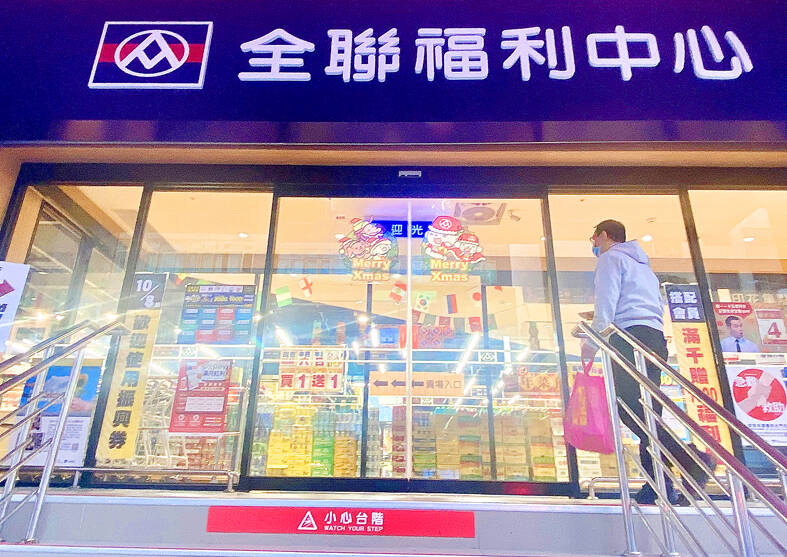PX Mart Co (全聯實業) has been fined NT$20 million (US$612,820) by the Fair Trade Commission (FTC) for failing to observe a condition set by the commission in 2022 for the approval of its merger with hypermarket chain operator RT-Mart International Ltd (大潤發), the commission said yesterday.
When the merger application was approved in 2022, PX Mart was asked to honor one of the seven conditions imposed by the commission, which prohibited PX Mart from applying the most favored pricing clause to its merchandise suppliers, FTC said in a statement.
However, after acquiring RT-Mart, PX Mart asked merchandise suppliers to provide the same discounts agreed with other distributors when they applied with the supermarket chain to place their new products on its shelves or raise product prices, the commission said.

Photo: CNA
The failure to observe that condition effectively transferred the risks caused by competition between PX Mart and other retailers to its merchandise suppliers, imposing an unnecessary financial burden on them, FTC said.
Although this has ostensibly increased the benefits for consumers by having low-priced goods on PX Mart’s shelves, the reality is that the move aimed to maintain its own profit margin by undermining competition in the distribution channel, it added.
Companies that fail to perform undertakings required by the commission face a fine ranging from NT$200,000 to NT$50 million, as stipulated by the Fair Trade Act (公平交易法), the commission said.
The FTC also has the power to ask a company to demerge, dispose of all or part of its shares, transfer part of its operations or remove certain people from their positions if the company does not observe the commission’s conditions, the commission added.
Another merger condition was that PX Mart maintain its existing policy of allowing suppliers to obtain shelf space without upfront payments for at least three years after the merger,
In December 2021, PX Mart offered NT$11.5 billion to take over 95.97 percent of the shares in RT-Mart from France-based Auchan Retail International SA and Taiwan-based conglomerate Ruentex Group (潤泰集團).
PX Mart has maintained RT-Mart as a separate brand and retained its management team after the merger.

Semiconductor shares in China surged yesterday after Reuters reported the US had ordered chipmaking giant Taiwan Semiconductor Manufacturing Co (TSMC, 台積電) to halt shipments of advanced chips to Chinese customers, which investors believe could accelerate Beijing’s self-reliance efforts. TSMC yesterday started to suspend shipments of certain sophisticated chips to some Chinese clients after receiving a letter from the US Department of Commerce imposing export restrictions on those products, Reuters reported on Sunday, citing an unnamed source. The US imposed export restrictions on TSMC’s 7-nanometer or more advanced designs, Reuters reported. Investors figured that would encourage authorities to support China’s industry and bought shares

TECH WAR CONTINUES: The suspension of TSMC AI chips and GPUs would be a heavy blow to China’s chip designers and would affect its competitive edge Taiwan Semiconductor Manufacturing Co (TSMC, 台積電), the world’s biggest contract chipmaker, is reportedly to halt supply of artificial intelligence (AI) chips and graphics processing units (GPUs) made on 7-nanometer or more advanced process technologies from next week in order to comply with US Department of Commerce rules. TSMC has sent e-mails to its Chinese AI customers, informing them about the suspension starting on Monday, Chinese online news outlet Ijiwei.com (愛集微) reported yesterday. The US Department of Commerce has not formally unveiled further semiconductor measures against China yet. “TSMC does not comment on market rumors. TSMC is a law-abiding company and we are

FLEXIBLE: Taiwan can develop its own ground station equipment, and has highly competitive manufacturers and suppliers with diversified production, the MOEA said The Ministry of Economic Affairs (MOEA) yesterday disputed reports that suppliers to US-based Space Exploration Technologies Corp (SpaceX) had been asked to move production out of Taiwan. Reuters had reported on Tuesday last week that Elon Musk-owned SpaceX had asked their manufacturers to produce outside of Taiwan given geopolitical risks and that at least one Taiwanese supplier had been pushed to relocate production to Vietnam. SpaceX’s requests place a renewed focus on the contentious relationship Musk has had with Taiwan, especially after he said last year that Taiwan is an “integral part” of China, sparking sharp criticism from Taiwanese authorities. The ministry said

US President Joe Biden’s administration is racing to complete CHIPS and Science Act agreements with companies such as Intel Corp and Samsung Electronics Co, aiming to shore up one of its signature initiatives before US president-elect Donald Trump enters the White House. The US Department of Commerce has allocated more than 90 percent of the US$39 billion in grants under the act, a landmark law enacted in 2022 designed to rebuild the domestic chip industry. However, the agency has only announced one binding agreement so far. The next two months would prove critical for more than 20 companies still in the process